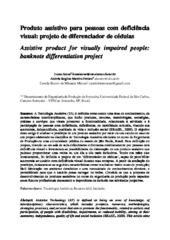Produto assistivo para pessoas com deficiência visual: projeto de diferenciador de cédulas
Resumen
Assistive Technology (AT) is defined as being an area of knowledge, of interdisciplinary characteristics, which includes products, resources, methodologies, strategies, practices, and services that aim to promote the functionality, related to activity and participation, of people with disabilities, impairments, or reduced mobility, aiming at their autonomy, independence, quality of life and social inclusion (BRASIL, 2009). This article aims to analyze the prototype of an assistive product through a case study of a project developed in the Assistive Technology discipline offered in the Production Engineering course at a public university in the state of São Paulo, Brazil. To define the project, difficulties faced daily by people with visual impairment were discussed in the classroom and possibilities for developing an assistive product that could provide a more inclusive routine or day-to-day life were raised. With this survey in hand, the project of a 'note differentiator' was defined as capable of allowing the visually impaired user autonomy during their purchases. From the evaluation of the prototype, the following characteristics stand out as results: low production cost; easy manufacturing in a domestic environment and without the need for technical knowledge; and portability so the user can carry it in their pocket. It was concluded that the proposed development of assistive products in the production engineering course can train these future professionals, highlighting the importance of inclusion in projective activities.
Colecciones
El ítem tiene asociados los siguientes ficheros de licencia:

